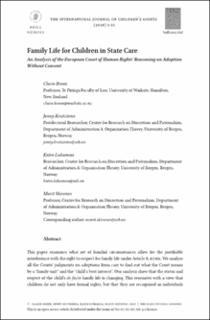Family Life for Children in State Care An Analysis of the European Court of Human Rights’ Reasoning on Adoption Without Consent
Journal article, Peer reviewed
Published version

Åpne
Permanent lenke
https://hdl.handle.net/11250/2735152Utgivelsesdato
2020Metadata
Vis full innførselSamlinger
- Department of Government [457]
- Registrations from Cristin [9791]
Originalversjon
The International Journal of Children's Rights. 2020, 28 (4), 715–747. https://doi.org/10.1163/15718182-28040001Sammendrag
This paper examines what set of familial circumstances allow for the justifiable interference with the right to respect for family life under Article 8, echr. We analyse all the Courts’ judgments on adoptions from care to find out what the Court means by a “family unit” and the “child´s best interest”. Our analysis show that the status and respect of the child’s de facto family life is changing. This resonates with a view that children do not only have formal rights, but that they are recognised as individuals within the family unit that states and courts must address directly. Family is both biological parents and child relationships, as well between children and foster parents, and to a more limited extent between siblings themselves. The Court’s understanding of family is in line with the theoretical literature, wherein the concept of family reflects the bonds created by personal, caring relationships and activities.
